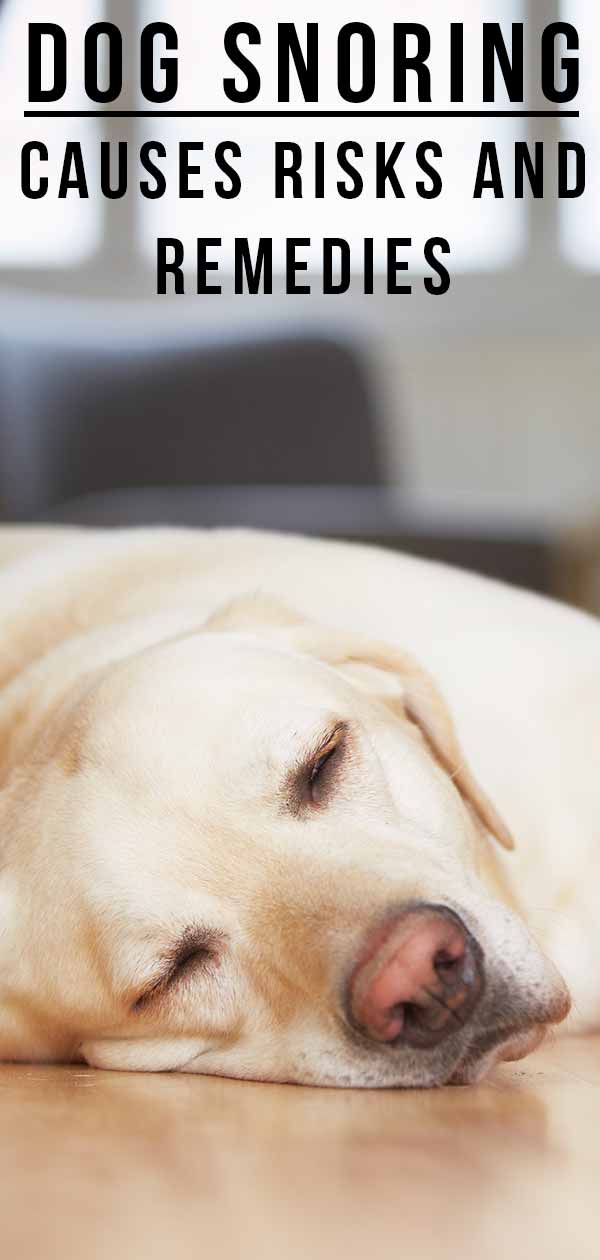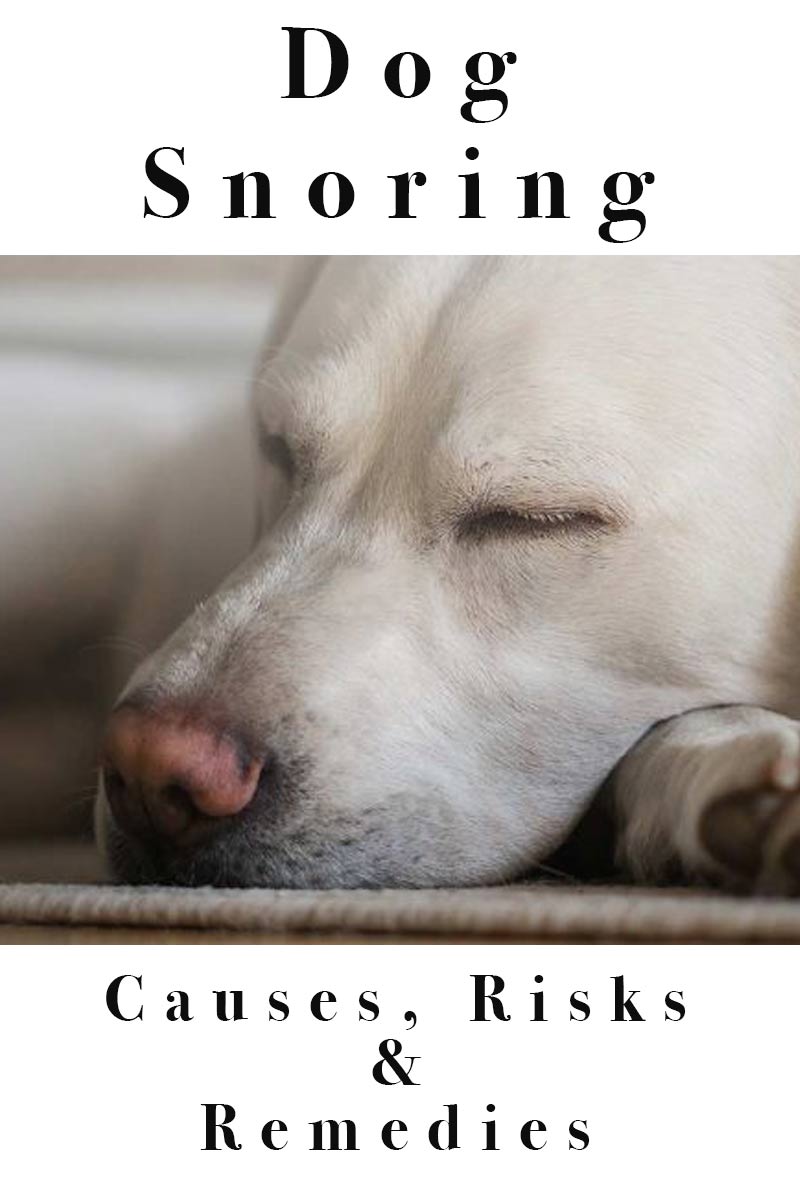Is Dog Snoring Normal?
Dog snoring is very common and has a number of potential causes. Infections, airway obstructions, medication and obesity all increase the likely of your dog’s snore. Canine snoring isn’t dangerous in itself, but it can be a sign of a health issue brewing. And a warning that there might be some lifestyle changes that your family need to make to keep your dog happy and well.
Contents
My dog snores, often very loudly! She sits in the corner of the room, her feet twitching in a deep sleep as she snores, perfectly content with the world.
This ten year old Labrador has snored regularly for her entire life, but no veterinarian has been able to determine why. It can be annoying if we are trying to watch TV, but it’s just one of those minor things dog owners have to put up. In fact, we are lucky because her snoring is healthy and normal. For some dogs, snoring might be a symptom of a health problem that needs action.
Why Do Dogs Snore?
Just as with people, snoring in dogs is a noise caused by vibration of the soft tissues in the mouth and throat. The vibration arises when something disrupts the normal flow of air along the dogs airway . Sometimes, this has a perfectly simple explanation. If your dog is one of those that likes to sleep on his back, his tongue might be blocking his airway and this can make him snore.
There are a number of other reasons for snoring. If we look at these, we can perhaps tackle the causes and understand how to stop a dog from snoring. For example, if your dog is overweight, maybe you can change her feeding pattern.
Reasons for Restricted Airflow
Here are some reasons why the flow of air might be disrupted in your dog’s nose or throat:
- Narrowing of the airways
- Brachycephalic dogs
- Blocked nose
- Infections
- Allergies
- Obesity
- Smoking
- Medication

Dog Snoring Due to Narrowed Airways
The interior of a healthy dogs throat is cleverly designed to keep him oxygenated and cool. Too much tissue, or tissue that is too floppy may cause a narrowing of the throat. Snoring is much more common in breeds with very short muzzles because there is not enough room in the dog’s mouth for all the soft tissue that lives there!
Brachycephalic Snoring
Over the years, humans bred dogs for different traits to suit different jobs. For many dog breeds, including English Bulldogs, Pugs, Shi-Tzus, King Charles Cavaliers, Chihuahuas, or Boxers, breeders selected short, broad skulls and short snouts. This inevitably means that these short-nosed breeds have shorter breathing passages. We call these breeds of dog brachycephalic and they are much more likely to snore.
Brachycephalic dogs have shorter snouts, but the soft palate at the back of their throat remained exactly the same through the generations and can appear enlarged. Owners of these breeds should be particularly aware of dog snoring and what it can mean.
Brachycephalic dogs often have something that vets call ‘everted laryngeal saccules,’ where soft tissue is pulled into the airway and blocks it. This leads to loud snoring, sometimes even when awake, which we will talk about later. Many brachycephalic dogs also have fully or partially blocked nostrils so that the opening is a ‘crescent’ instead of a nice open ‘tunnel’. The condition is called nasal stenosis, a congenital condition that can obstruct nasal passages and restrict breathing.
Turbinates and Breathing: A Quick Science Lesson!
Dogs, like all mammals, have tiny bone ‘shelves’ in the nasal cavity. These are called turbinates (or sometimes a naval concha) and create a large surface area. Turbinates have lots of interesting functions:
- Add warmth and humidity to the air we breathe in and protect the lungs from cold, dry air
- Provide a filter to remove pathogens including bacteria, viruses, and dust
- Give a larger surface area for smell sensors
As you can imagine, in dogs, these turbinates are extensive to give a great sense of smell. The spongy bone plates also provide a great heat exchange mechanism for the body, helping dogs and other canids conserve water. Turbinates let them chase for a long time and live in dry deserts or the cold arctic.
However, for brachycephalic dogs with shortened skulls, the turbinates don’t have enough room and can grow backwards into their nasopharynx, This can create the blockage that causes them to snore. Because there isn’t a lot of room back there, swollen tissues due to infection or injury can make things much worse. Bad breathing difficulties can be distressing for the dog and you might think about visiting a vet.
Why Is My Dog Snoring When Awake?
One thing we should clear up, before we go any further, is that for the purposes of snoring in this article, we are talking about dogs who are asleep. Sometimes people ask about why do dogs snore while awake. This isn’t really snoring at all, it is noisy breathing and it is not a good sign. It could be because you have a brachycephalic dog, as described above. However, there are many other reasons why dogs can make snoring sounds when awake. Again, most of these are due to restricted air flow.
Any dog that is making snoring sounds while awake needs to be thoroughly checked over by a qualified vet within the next day or so to have him checked over. And, if he seems unwell or his breathing is labored, take him in right away. Okay, let’s have a look at what happens when a dog’s nostrils get ‘blocked’
Dog Snoring Caused by an Obstruction
While most healthy Labradors have wide clear nasal openings, these can become blocked temporarily. An obstruction may be a symptom of a nasty infection or more serious type of blockage. Let’s start by looking at nasal obstructions.
Sometimes, your dog may have a foreign body wedged up its nose. These could be grass seeds or other plant materials he picked up on his walk. These will block his nose and make him snore. If your dog is sneezing a lot or rubbing his nose with discomfort, he could have something stuck up there. A blockage may also be accompanied by nasal discharge. Take a look and, if there is something is stuck up his nose, maybe it is time to see the vet to have it removed.
In most cases, a blocked nose is the result of a build up of mucous as a result of a respiratory infection, together with inflammation of the airways.
Dog Snoring Caused by Infections
Like people, dogs are susceptible to upper respiratory infections. Infections like Kennel Cough – a kind of canine flu – may cause airways to become blocked and inflamed, and can trigger temporary snoring. If that is the case, the snoring should clear up once the dog recovers.
Snoring and Dog Allergies
Just like people, some dogs suffer from allergies. An allergy can affect your dog’s airways and cause snoring due to the swelling of the tissues in the mouth and throat. This is often accompanied by a clear and watery nasal discharge. If your dog shows signs of an allergic reaction for the first time, take her to the vet for a check up to make sure that it’s nothing more serious. If it is an allergy, your vet can prescribe medications to relieve her symptoms and, in turn, reduce the snoring.
Cigarette Smoke and Snoring
Dogs living with cigarette smokers may be more prone to snoring. They are also at greater risk of developing allergies and respiratory infections. That’s because your dog’s lungs and airways are very similar to ours, and can be affected by chemicals and irritants in the same way.
Medications That Cause Dog Snoring
Sometimes, you might notice that your dog only developed snoring when he started a course of medication. Could the medicine be to blame? It could, because some medicines have side effects including restricted airways. Pain relievers, and some other medicines, may cause the throat to relax more than usual, which can trigger a bout of the snores.
If you think that medicines may be the cause, check with your vet whether medication is the possible cause of doggy snoring. If your dog needs the medication, then you will probably have to live with the snoring, although your vet might be able to treat the symptoms.
Another very common cause of snoring in dogs is obesity. Just as with humans, being overweight can trigger the condition.
Dog Snoring Caused by Obesity
Probably the most common reason for snoring in Labradors and many other breeds is a weight problem. Your dog does not have to be grossly obese for this to happen. Just being a little overweight may be enough of a trigger to start a dog snoring
In a very overweight dog, pads of fat may be deposited around the throat, and these can interfere with the airflow. Basically, if your Labrador snores and you can’t feel his ribs, his weight may be the cause. And, if your slightly overweight, snoring dog seems otherwise perfectly well, then reducing his weight a little is a good starting point in the battle against snoring.
In fact, although we are all tempted to give a bit of extra food when faced with pleading dog eyes, it’s good to resist. Losing weight can also prevent a range of other health problems, and is usually worth doing.
Nasal Polyps and Tumors
Just like humans, dogs can get nasal polyps, small pink growths in the nose. They can grow large enough to obstruct air flow and cause snoring. Quite often, they can cause distressing nose bleeds. It is definitely worth getting them checked by a vet. Apart from causing snoring, even when your dog is awake, they can be a sign of tumors. Removing them can stop snoring and, if they were a sign of tumors, might allow your vet to catch the condition early.
Nasal tumors commonly affect older dogs and some specific breeds such as German Shepherds. Treating them can involve surgery or radiotherapy, ideally before they become large and malignant. What happens if you can’t work out why your dog is snoring? What do you do then?
Dogs that Snore for No Reason
For many snoring dogs, like my Labrador, Tess, who is slim and healthy, there is often no apparent cause. It’s just something that many dogs do and we don’t know why. A bit like humans, really! So,what if your dog is fit and able to run and play normally without breathing noisily. You look and see no no signs of any obstruction in his airway, and no discharge or other symptoms of infection. In this case, there may be no cause for the canine snoring.

Free Labrador Updates!
Get my training tips, news, reviews, and the latest from The Labrador Site delivered to your inbox




So my husband and I just brought home our first lab. He is 10 weeks old and is the little brother we got for our 5 yo Boxer’s 6th Birthday (04/15), since his older brother passed last year and he has been down (so were we). I have only had Boxers since I got my first one for my seventh birthday. So we are both new to the lab breed. Our new little guy snores so loud tgat you wouldn’t believe something that little even could. He also breathes pretty fast when sleeping. I was quite worried before I read this article; so thank you for writing it. Bobby does have his check-up next week and I will still mention it to the vet, but will no longer fret over it.